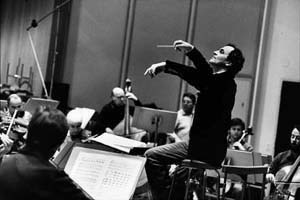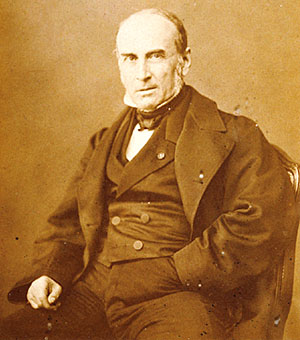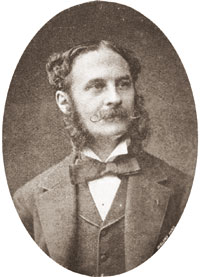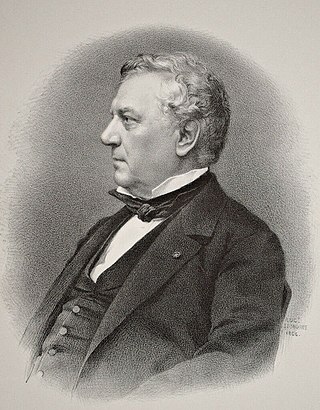Tomb
His tomb is in the ambulatory of the Lausanne Cathedral.
hic iacet | Here rests
|
Charles Guillaume Loys de Bochat (born 11 December 1695 in Lausanne, died 4 April 1754, also in Lausanne) was an 18th-century Swiss jurist and antiquarian (Lausanne at the time was a subject territory controlled by Berne).
He studied theology in Basle, which he interrupted for health reasons, and later changed his subject to law, in which he graduated in 1717. He became professor of law in Lausanne in 1718, but he was granted leave to travel for three years, which he spent in Halle, in Leyden and in France.
From 1721, he taught law at the Lausanne Academy, where he acted as rector from 1727 to 1730. In 1738, he proposed to transform the academy into a full university, without success.
Loys de Bochat is best known for his major work, Mémoires critiques pour servir d'Eclaircissemens sur divers points de l'Histoire ancienne de la Suisse, which appeared in three volumes in 1747-1749. This work is dedicated to examining the early history of Switzerland, especially the Gaulish Helvetii, and their legacy in Swiss toponymy.
His tomb is in the ambulatory of the Lausanne Cathedral.
hic iacet | Here rests
|

The University of Lausanne in Lausanne, Switzerland was founded in 1537 as a school of Protestant theology, before being made a university in 1890. The university is the second oldest in Switzerland, and one of the oldest universities in the world to be in continuous operation. As of fall 2017, about 15,000 students and 3,300 employees studied and worked at the university. Approximately 1,500 international students attend the university, which has a wide curriculum including exchange programs with other universities.

Charles Édouard Dutoit is a Swiss conductor. He is currently the principal guest conductor for the Saint Petersburg Philharmonia and co-director of the MISA Festival in Shanghai. In 2017, he became the 103rd recipient of the Royal Philharmonic Society Gold Medal Award. Dutoit held previous positions with the London Royal Philharmonic Orchestra, the Philadelphia Orchestra, the Orchestre Symphonique de Montréal, the Tokyo NHK Symphony and the Orchestre National de France. As of 2017, he is conductor emeritus of the Verbier Music Festival Orchestra. He is an honorary member of the Ravel Foundation in France and the Stravinsky Foundation in Switzerland. In December 2017, following allegations of sexual assault, the Boston and San Francisco Symphonies cancelled his engagements. In a statement, Dutoit denied the charges.

Jean-Philippe Loys de Cheseaux was a Swiss astronomer.

Jean Marie Pardessus was a French lawyer.

Paris-Panthéon-Assas University or Assas University, commonly known as Assas ([asas]) or Paris 2, is a university in Paris, often described as the top law school of France. It is considered as the direct inheritor of the Faculty of Law of Paris, the second-oldest faculty of Law in the world, founded in the 12th century.

Pierre Guillaume Frédéric le Play was a French engineer, sociologist and economist.

Louis-Jean-François Lagrenée was a French rococo painter and student of Carle van Loo. He won the Grand Prix de Rome for painting in 1749 and was elected a member of the Académie royale de peinture et de sculpture in 1755. His younger brother Jean-Jacques Lagrenée was also a painter.
Guy de Pourtalès was a Swiss author.

Simon-Charles Miger was a French engraver, most notable for the plates he produced for La Ménagerie du Muséum national d'histoire naturelle by Lacépède, Saint-Hilaire and Cuvier.
Jean-Jacques Chevallier,, was a 20th-century French professor, jurist and historian and Academician. Professor at the Paris Faculty of Law and Economic Sciences, member of the Academy of Political and Moral Sciences (1964–83), he left numerous works, in particular a major classic on "The Great Political Works from Machiavelli to Our Day", recently reissued with an update by Yves Guchet. Several subsequent historians in France have acknowledged his influence; Jean-Pierre Gross writes of "A chronological and historical account, in the tradition established by Jean-Jacques Chevallier", and according to the French jurist Georges Lavau: "We had a few masters who had explored certain territories, almost in solitude: André Siegfried, Raymond Aron, Jean-Jacques Chevallier, Georges Burdeau, Jean Stoetzel."
Louis Maillard was a French-born Swiss astronomer and professor of astronomy and mathematical sciences.
Abraham Ruchat was a Swiss Protestant theologian and historian.
William Seston was a 20th-century French historian and epigrapher, a specialist of the history of the Roman Empire. He was professor at the Sorbonne and a member of the Académie des Inscriptions et Belles-Lettres.

Guillaume Marie Charles Henri Mollat was a French prelate and historian.

Carlos Ibáñez e Ibáñez de Ibero, 1st Marquis of Mulhacén, was a Spanish divisional general and geodesist. He represented Spain at the 1875 Conference of the Metre Convention and was the first president of the International Committee for Weights and Measures. As a forerunner geodesist and president of the International Geodetic Association, he played a leading role in the worldwide dissemination of the metric system. His activities resulted in the distribution of a platinum and iridium prototype of the metre to all States parties to the Metre Convention during the first meeting of the General Conference on Weights and Measures in 1889. These prototypes defined the metre right up until 1960.

Stéphen François Emile Liégeard was a French lawyer, administrator, deputy, writer and poet. He gave the name "Côte d'Azur" to the French Riviera.

Augustin Charles Renouard was a French lawyer and politician. During a long career he worked as an advocate, was a member of the chamber of deputies, was vice-president of Société d'économie politique, sat on the Court of Cassation and was a Senator. He published many books and articles, and was elected a member of the Académie des Sciences Morales et Politiques of the Institut de France. He made important contributions to the law on copyright, which he saw as a temporary monopoly granted to the author rather than a right of ownership.

Marcel Planiol was a French professor of law at the University of Rennes, then at the Sorbonne. He wrote on the law and on historical Brittany. He is known for his Elementary Treatise of Civil Law (1901), which attempted to explain French civil law in terms of elementary principles, particularly the maxims of Roman law.
Bernadette Menu is a French archaeologist and Egyptologist, whose research work on ancient Egypt is widely known. She is mother of the writer Jean-Christophe Menu.
The Prix Bordin is a series of prizes awarded annually by each of the five institutions making up the Institut Français since 1835.